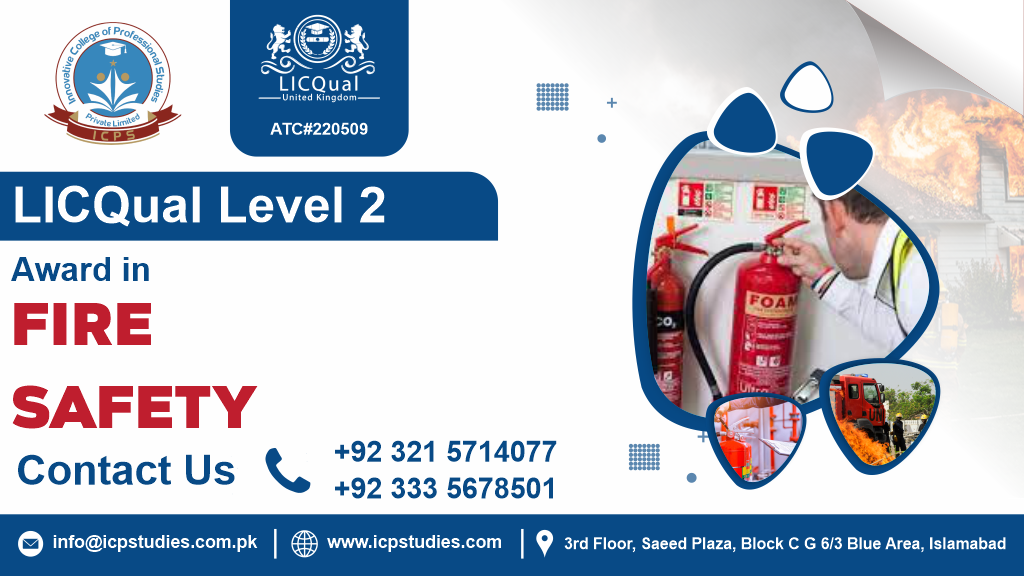Our comprehensive program delves deeper into the complexities of fire safety management, covering advanced topics such as fire risk assessment, fire safety legislation, emergency planning, and fire safety management systems. You’ll gain a deeper understanding of the principles and practices that underpin effective fire safety management in diverse settings.
Learn from industry-leading experts who bring years of experience and expertise to the table. Our training sessions are filled with practical insights, case studies, and real-world scenarios to help you apply theoretical knowledge to complex fire safety challenges. Gain the confidence to make informed decisions and implement best practices in fire safety management.
Whether you’re a health and safety manager, facility manager, fire safety officer, or aspiring to advance your career in fire safety management, this course is tailored to meet your needs. Our program provides valuable insights and tools that are directly applicable to your role, empowering you to drive improvements in fire safety practices within your organization.
Upon successful completion of the program, you’ll receive the prestigious LICQual Level 2 Award in Fire Safety certification. This globally recognized accreditation demonstrates your expertise and commitment to excellence in fire safety management, enhancing your credibility and career prospects.
Don’t miss this opportunity to elevate your fire safety expertise and take your career to new heights. Enroll now in the LICQual Level 2 Award in Fire Safety today and unlock a world of possibilities in fire safety management.
All About Level 2 Award in Fire Safety
Course Overview
The LICQual Level 2 Award in Fire Safety is an advanced training program designed to equip individuals with comprehensive knowledge and advanced skills in fire safety management. This course goes beyond the basics covered in Level 1 and provides a deeper understanding of fire safety principles, regulations, risk assessment, and management practices. Developed by industry experts, the Level 2 Award in Fire Safety is ideal for professionals who are responsible for fire safety management within their organizations or aspire to advance their careers in this field.
Participants will gain an in-depth understanding of relevant fire safety legislation, regulations, and standards applicable to their jurisdiction. This includes understanding legal responsibilities, compliance requirements, and the implications of non-compliance.
The course covers the process of conducting comprehensive fire risk assessments, identifying hazards, evaluating risks, and implementing control measures. Participants will learn how to assess fire risks in different environments and develop effective risk mitigation strategies.
Effective emergency planning is critical for minimizing the impact of fire emergencies. Participants will learn how to develop emergency response plans, including evacuation procedures, communication strategies, and coordination with emergency services. Practical exercises may be included to simulate emergency scenarios and test response plans.
Participants will explore the principles and components of Fire Safety Management Systems (FSMS), such as documentation, training, inspection, and audit processes. The course emphasizes the importance of proactive management and continuous improvement in maintaining effective fire safety standards.
Upon successful completion of the LICQual Level 2 Award in Fire Safety course, participants typically receive a recognized certification, demonstrating their advanced competency in fire safety management. This certification can enhance their credibility, career prospects, and ability to contribute to the development and implementation of effective fire safety strategies within their organizations.
Study Units
Learning Outcomes
Here are the outcomes associated with each of the study units:
1. Introduction to Fire Safety:
- Understand the importance of fire safety in protecting lives, property, and the environment.
- Recognize the basic principles of fire behavior, including the fire triangle and fire tetrahedron.
- Identify common causes of fires and their potential consequences.
- Gain awareness of relevant fire safety legislation, regulations, and standards.
2. Fire Risk Assessment:
- Develop the skills to conduct comprehensive fire risk assessments in various environments.
- Identify potential fire hazards, such as ignition sources, fuel sources, and oxygen sources.
- Evaluate the likelihood and potential consequences of fire incidents.
- Implement appropriate control measures to mitigate fire risks and ensure compliance with regulations.
3. Fire Prevention and Safety Measures
- Learn proactive measures to prevent fires from occurring, such as good housekeeping practices and maintenance of fire safety equipment.
- Understand the importance of fire detection and warning systems in early fire detection and evacuation.
- Identify strategies for minimizing fire hazards, such as proper storage of flammable materials and safe handling of ignition sources.
- Promote a culture of fire safety within organizations through training, awareness campaigns, and employee engagement.
4. Emergency Response and Evacuation:
- Develop effective emergency response plans, including procedures for raising the alarm, notifying emergency services, and evacuating occupants.
- Understand the roles and responsibilities of personnel during emergency situations, including fire wardens and designated first responders.
- Learn techniques for managing evacuations safely and efficiently, including crowd control and assistance for individuals with disabilities.
- Implement communication strategies to ensure clear and timely dissemination of information during emergencies.
5. Fire Safety Management:
- Gain insights into the principles and components of Fire Safety Management Systems (FSMS), such as documentation, training, inspection, and audit processes.
- Understand the importance of leadership and commitment to maintaining a strong fire safety culture within organizations.
- Develop skills in conducting fire safety audits and inspections to identify deficiencies and ensure compliance with regulations.
- Implement continuous improvement strategies to enhance fire safety practices and reduce the risk of fire incidents.
By mastering these study units and achieving the associated outcomes, participants will be equipped with the knowledge and skills necessary to effectively prevent, identify, and respond to fire emergencies in diverse settings. This comprehensive understanding of fire safety principles, risk assessment, prevention measures, emergency response, and management strategies is essential for promoting safety and minimizing the potential impact of fires on individuals, property, and the environment.
Admission Criteria
Here are the typical entry requirements for the LICQual Level 2 Award in Fire Safety course:
Entry Requirements:
- Completion of Level 1 Fire Safety Course (or Equivalent): Prospective participants are usually required to have completed a Level 1 Fire Safety course or hold an equivalent certification. This ensures that participants have a foundational understanding of fire safety principles, terminology, and basic concepts before progressing to the advanced level.
- Work Experience in Related Field: While not always mandatory, having relevant work experience in a field related to health and safety, facilities management, emergency response, or fire safety can be beneficial. Practical experience provides context for understanding course materials and applying concepts to real-world situations.
- Educational Background: There are typically no formal educational prerequisites for enrolling in the Level 2 Fire Safety course. However, participants should have a basic level of literacy and numeracy skills to engage with course materials, complete assessments, and participate in practical exercises.
- Health and Fitness: Participants should be in reasonable health and fitness to participate in practical activities, such as emergency response simulations and evacuation drills. Individuals with mobility issues or health conditions that may impact their ability to engage in physical activities should inform course organizers in advance to ensure appropriate accommodations can be made.
- Commitment to Continuing Education: Enrolling in the Level 2 Fire Safety course requires a commitment to continuing education and professional development in the field of fire safety management. Participants should demonstrate a genuine interest in enhancing their knowledge and skills to contribute to safer workplaces and communities.
- Language Proficiency: Since the course materials and assessments are typically conducted in English, participants should have a sufficient level of proficiency in the language to understand and engage with the content effectively. Basic reading, writing, and verbal communication skills are essential.
- Compliance with Local Regulations: Depending on the jurisdiction, there may be specific regulatory requirements or prerequisites for enrolling in fire safety courses. Participants should ensure they meet any local or industry-specific requirements before enrolling in the Level 2 Fire Safety course.
By ensuring that participants meet these entry requirements, course organizers can optimize the learning experience and ensure that individuals are adequately prepared to engage with the course content and achieve the desired learning outcomes in advanced fire safety management.
Ideal Candidate
This course is ideal for:
- Health and Safety Managers: Professionals responsible for overseeing health and safety practices within organizations will benefit greatly from this course. The advanced knowledge and skills gained from the Level 2 Fire Safety course enable health and safety managers to develop and implement robust fire safety management systems, conduct thorough risk assessments, and ensure compliance with regulations.
- Facility Managers: Individuals tasked with managing buildings, facilities, or properties have a critical role in ensuring fire safety within their premises. The Level 2 Fire Safety course equips facility managers with the expertise to identify fire hazards, implement preventive measures, develop emergency response plans, and oversee fire safety inspections and audits.
- Fire Safety Officers and Consultants: Those working directly in fire safety roles, including fire safety officers, consultants, and advisors, will find this course invaluable for expanding their knowledge and skills. The advanced training provided in the Level 2 Fire Safety course enhances their ability to assess fire risks, provide expert guidance on fire safety practices, and assist organizations in achieving and maintaining compliance with fire safety regulations.
- Emergency Response Team Leaders: Individuals designated as emergency response team leaders or coordinators play a crucial role in preparing for and responding to fire emergencies. This course equips them with the expertise to develop comprehensive emergency response plans, coordinate evacuation procedures, and lead effective emergency response efforts during fire incidents.
- Safety Professionals Seeking Career Advancement: For safety professionals looking to advance their careers and take on leadership roles in fire safety management, the Level 2 Fire Safety course provides a valuable opportunity to expand their knowledge and credentials. Certification at this level demonstrates a high level of competency and commitment to excellence in fire safety management, enhancing career prospects and opportunities for advancement.
- Anyone with a Responsibility for Fire Safety: Beyond specific job titles, the Level 2 Fire Safety course is suitable for any individual with a responsibility for fire safety within their organization or community. Whether you’re a business owner, supervisor, or team leader, this course provides essential knowledge and skills to effectively manage fire risks, promote safety awareness, and protect lives and property.
Overall, the LICQual Level 2 Award in Fire Safety course is designed to meet the needs of professionals across various industries and roles who are committed to enhancing fire safety practices, ensuring regulatory compliance, and creating safer environments for all.
FAQs about Level 2 Award in Fire Safety







